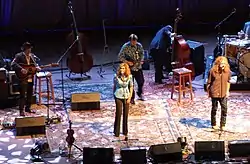The Battle of Evermore
"The Battle of Evermore" is a folk duet sung by Robert Plant and Sandy Denny, included on Led Zeppelin's untitled 1971 album, commonly known as Led Zeppelin IV. The song's instrumentation features acoustic guitar and mandolin playing, while the lyrics allude to J. R. R. Tolkien's fantasy novel The Lord of the Rings.
| "The Battle of Evermore" | |
|---|---|
| Song by Led Zeppelin | |
| from the album Led Zeppelin IV | |
| Released | 8 November 1971 |
| Recorded | 1971 |
| Studio | Headley Grange, Hampshire, England |
| Genre | |
| Length | 5:38 |
| Label | Atlantic |
| Songwriter(s) | |
| Producer(s) | Jimmy Page |
Writing and production
Writing
The song was written by Jimmy Page and Robert Plant at Headley Grange while Page was experimenting on John Paul Jones's mandolin.[5][6] Page explained in 1977 that "'Battle of Evermore' was made up on the spot by Robert [Plant] and myself. I just picked up John Paul Jones's mandolin, never having played a mandolin before, and just wrote up the chords and the whole thing in one sitting."[7]
Allusions to The Lord of the Rings
The song, like Led Zeppelin's "Ramble On" and "Misty Mountain Hop", makes references to The Lord of the Rings by J. R. R. Tolkien,[8][9] with "The Dark Lord rides in force tonight and time will tell us all" in line 4, "The drums will shake the castle wall, the Ringwraiths ride in black" in line 18, and mentions of war and swords (line 13), shooting with a bow (line 19), magic runes (line 20) and "the dragon of darkness" in line 24.[10] The J. R. R. Tolkien Encyclopedia states that the three songs make "direct references to Gollum, Mordor, the Ringwraiths, and events described in The Silmarillion and [Lord of the Rings]".[11]
The Oxford Handbook of Music and Medievalism treats the song as "fantasy medievalism", seeing allusions to multiple features of Tolkien's Middle-earth.[9] It notes that the song "specifically alludes" to the Dark Lord and the Ringwraiths, while the "Queen of Light" mentioned is "possibly" the elf-queen Galadriel.[9] It states that the battle in the song "has often been identified by fans" as the Battle of the Pelennor Fields.[9] Describing the effect of the song, it writes that Plant makes use of the feeling of nostalgia with the "strain and desperation" in his "vocal cries" combined with the "haunting, pastoral soundscape" that together set up "the destructive world of war in opposition to an idealized and Arcadian peaceful home".[9]
Sandy Denny

Plant felt he needed another voice to tell the story, and for the recording of the song, singer Sandy Denny was invited to duet with Plant. Denny was a former member of British folk rock group Fairport Convention, with whom Led Zeppelin had shared a bill in 1970 at the Bath Festival of Blues and Progressive Music. Plant played the role of the narrator and Denny represented the town crier. Page elaborated that "[The song] sounded like an old English instrumental first off. Then it became a vocal and Robert did his bit. Finally we figured we'd bring Sandy by and do a question-and-answer-type thing."[7]
To thank her for her involvement, Denny was given the symbol on the album sleeve of three pyramids (the four members of Led Zeppelin each chose their own symbols for the album). This is the only song Led Zeppelin ever recorded with a guest vocalist. In an interview he gave in 1995 to Uncut magazine, Plant stated that "[F]or me to sing with Sandy Denny was great. We were always good friends with that period of Fairport Convention. Richard Thompson is a superlative guitarist. Sandy and I were friends, and it was the most obvious thing to ask her to sing on 'The Battle of Evermore'. If it suffered from naivete and tweeness—I was only 23—it makes up for it in the cohesion of the voices and the playing."[12]
Live performances

"The Battle of Evermore" was played live at Led Zeppelin concerts during the band's 1977 North American Tour. For these live performances, Jones sang Denny's vocals and played acoustic guitar whilst Page played mandolin. Sometimes John Bonham sang Denny's vocals along with Jones. Page and Plant also recorded a version of the song in 1994, released on their album No Quarter: Jimmy Page and Robert Plant Unledded. Singer Najma Akhtar sang Denny's vocal part .Fairport Convention performed "The Battle of Evermore" with guest vocalists Plant and Kristina Donahue at Fairport's Cropredy Convention on 9 August 2008.
Plant and Alison Krauss regularly performed "The Battle of Evermore" on their tour of US and Europe in spring and summer 2008 in promotion of their 2007 collaboration album Raising Sand.[13]
Other versions
An instrumental version of the song is featured on the companion audio CD on the remastered deluxe 2CD version of Led Zeppelin IV, titled The Battle of Evermore (Mandolin/Guitar Mix From Headley Grange), recorded on 29 January 1971, at the Rolling Stones Mobile at Headley Grange with engineer Andy Johns. It is much shorter than the original, with a running time of 4:13 rather than 5:51.[14]
Accolades
| Year | Publication | Country | Accolade | Rank |
|---|---|---|---|---|
| 2003 | Blender | US | "The 1001 Greatest Songs to Download Right Now!"[15] | * |
| 2004 | Q | UK | "150 Greatest Rock Lists Ever" (10 Songs Based on Novels)[16] | 4 |
| "1010 Songs You Must Own!"[17] | * |
(*) designates unordered lists.
See also
- List of cover versions of Led Zeppelin songs – "The Battle of Evermore" entries
References
- Carruthers, Bob (2011). Led Zeppelin – Uncensored on the Record. Coda Books Ltd. ISBN 978-1-9085-3846-8.
High points included the twisty complexity of 'Black Dog', the folk whimsy of 'The Battle of Evermore' and the career best of 'Stairway to Heaven'
- Clarke, Donald (1998). The Penguin Encyclopedia of Popular Music. Penguin Books. p. 737. ISBN 978-0-1405-1370-7.
folk direction pursued with The Battle of Evermore' (Plant's duet with Sandy Denny)
- Erlewine, Stephen Thomas. "Led Zeppelin – Led Zeppelin IV". AllMusic. Retrieved 13 March 2014.
- Ramirez, AJ (31 October 2011). "Led Zeppelin – "The Battle of Evermore"". PopMatters. Retrieved 25 August 2015.
- Lewis, Dave (1994). The Complete Guide to the Music of Led Zeppelin. Omnibus Press. ISBN 0-7119-3528-9.
- Rosen, Steven (July 1977). "1977 Jimmy Page Interview (Audio/Text)". Guitar Player. Archived from the original on 28 May 2007.
- Schulps, Dave (October 1977). "Interview with Jimmy Page". Trouser Press. Retrieved 13 March 2014 – via Iem.ac.ru.
- Greene, Andy (13 December 2012). "Ramble On: Rockers Who Love 'The Lord of the Rings'". Rolling Stone. Retrieved 15 February 2021.
- Carlos, Caitlin Vaughn (2020). "'Ramble On': Medievalism as a Nostalgic Practice in Led Zeppelin's Use of J. R. R. Tolkien". In Meyer, Stephen C.; Yri, Kirsten (eds.). The Oxford Handbook of Music and Medievalism. Oxford University Press. pp. 530–546. ISBN 978-0-19-065844-1.
- Inman, Davis. "Behind the Song: Led Zeppelin, 'The Battle of Evermore'". American Songwriter. Retrieved 15 February 2021.
- Burdge, Anthony; Burke, Jessica (2007). "Popular Music". In Drout, Michael D. C. (ed.). The J. R. R. Tolkien Encyclopedia. Routledge. pp. 538–540. ISBN 978-0-415-96942-0.
- "Good Times...Bad Times". Uncut. May 2005. p. 57. ISSN 1368-0722.
- "Robert Plant and Alison Krauss at the Birmingham NIA". Birmingham Post. 6 May 2008. Retrieved 13 March 2014.
- "LED ZEPPELIN IV". Led Zeppelin. Retrieved 2 December 2022.
- "Standout Tracks from the 500 CDs You Must Own – 2003". Blender. Archived from the original on 29 June 2008. Retrieved 10 February 2009 – via Acclaimed Music.
- "150 Greatest Rock Lists Ever – Book of Rock – July 2004". Q. Retrieved 10 February 2009 – via Rocklist.net.
- "1010 Songs You Must Own! – Q50 – #3: Duets – September 2004". Q. Retrieved 10 February 2009 – via Rocklist.net.